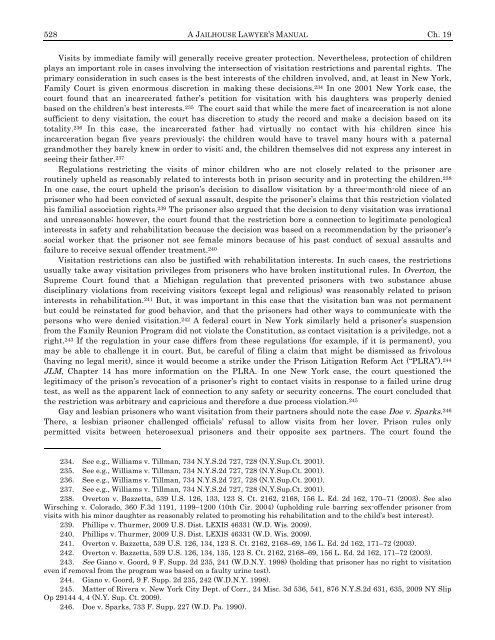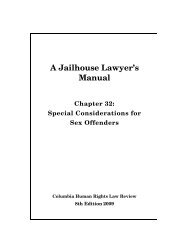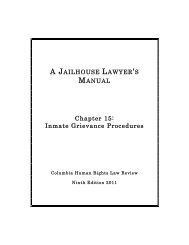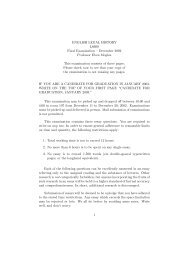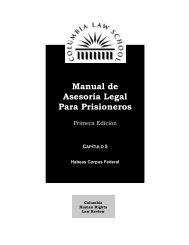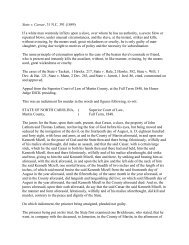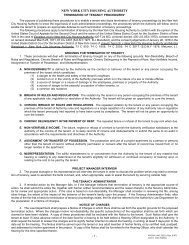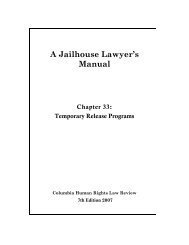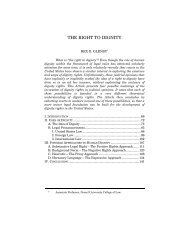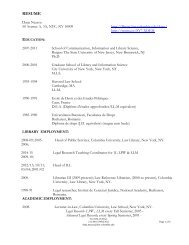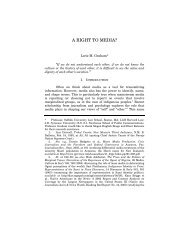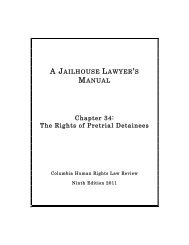Ch. 19 YOUR RIGHT TO COMMUNICATE WITH THE OUTSIDE WORLD 527detainees, must be reasonable. 221 Prison officials may also restrict some of <strong>the</strong> rights of visi<strong>to</strong>rs. 222 TheTurner reasonableness standard also applies <strong>to</strong> visitation, and so courts can invalidate unreasonablerestrictions. 223 Contact visits are not constitutionally required for pretrial detainees or for prisoners. 224The decision as <strong>to</strong> who may visit may be a matter of legitimate security concerns and is largely up <strong>to</strong>prison officials’ discretion. If this is <strong>the</strong> case, it is up <strong>to</strong> <strong>the</strong> prison official <strong>to</strong> produce evidence that visitationrestriction was in response <strong>to</strong> a security concern. It is <strong>the</strong>n <strong>the</strong> inmate’s burden <strong>to</strong> show by substantialevidence that <strong>the</strong> prison officials’ response was exaggerated and unjustified. However, within <strong>the</strong> realm ofjustified restrictions, methods such as visit lists that only allow certain types of people <strong>to</strong> visit have beenused held <strong>to</strong> be lawful. 225 In Over<strong>to</strong>n, for instance, <strong>the</strong> Supreme Court upheld a regulation requiring anapproved visi<strong>to</strong>r list as reasonably related <strong>to</strong> security interests. 226 Courts have also upheld rules restrictingvisits <strong>to</strong> those who have a personal or professional relationship with <strong>the</strong> prisoner and rules denying visits byex-convicts 227 and parties suspected of smuggling contraband. 228 The Supreme Court upheld similarregulations in Over<strong>to</strong>n. 229 The Seventh Circuit of <strong>the</strong> U.S. Court of Appeals recently denied <strong>the</strong>constitutional claims of a prisoner whose niece and daughter had been removed from his visi<strong>to</strong>r list and whohad previously been convicted of violent sex offenses and admitted <strong>to</strong> raping two children. 230 Based on <strong>the</strong>holdings in Over<strong>to</strong>n and Turner, <strong>the</strong> Seventh Circuit stated that a prison policy that restricts a prisoner’sconstitutional rights is valid if rationally related <strong>to</strong> legitimate penological interests, an analysis thatrequires <strong>the</strong> court <strong>to</strong> consider four issues: (1) whe<strong>the</strong>r a rational relationship exists between <strong>the</strong> policy and<strong>the</strong> interest it purports <strong>to</strong> advance; (2) whe<strong>the</strong>r <strong>the</strong>re exists o<strong>the</strong>r ways <strong>to</strong> exercise <strong>the</strong> right in question; (3)<strong>the</strong> impact that accommodating <strong>the</strong> right will have on prison resources; and, (4) <strong>the</strong> absence of alternatives<strong>to</strong> <strong>the</strong> policy. 231 A 2009 New York case held that <strong>the</strong> Commissioner of Correctional Services had a rationalbasis for denying <strong>the</strong> prisoner’s request <strong>to</strong> participate in a family reunion program, emphasizing that thisdecision is highly discretionary and will be upheld as long as <strong>the</strong>re is a rational basis. 232 Since <strong>the</strong>Commissioner in this case considered <strong>the</strong> appropriate fac<strong>to</strong>rs, including <strong>the</strong> prisoner’s disciplinary recordand participation in counseling sessions, <strong>the</strong> Commissioner’s decision based upon <strong>the</strong> brutal nature of <strong>the</strong>prisoner’s crimes was completely rational. 233221. See Martin v. Tyson, 845 F.2d 1451, 1458 (7th Cir. 1988) (per curiam) (upholding policy limiting pre-trialdetainee's telephone access <strong>to</strong> every o<strong>the</strong>r day).222. See Gray v. Bruce, 26 Fed. Appx. 819, 823–24 (10th Cir. 2001) (holding that subjecting a prisoner’s wife <strong>to</strong> an“ion spectrometer test,” which tests for <strong>the</strong> presence of illegal drugs, was not a per se violation of her 4th Amendmentprivacy rights; however, <strong>the</strong> court ultimately held that she had stated enough facts <strong>to</strong> show that <strong>the</strong> particular searchmethod applied <strong>to</strong> her could be unconstitutional because of its unreliability and could violate her Fifth Amendment right<strong>to</strong> be free from self-incrimination).223. Over<strong>to</strong>n v. Bazzetta, 539 U.S. 126, 132, 123 S. Ct. 2162, 2168, 156 L. Ed. 2d 162, 170 (2003) (applying Turnertest <strong>to</strong> Michigan regulations restricting visits).224. See Block v. Ru<strong>the</strong>rford, 468 U.S. 576, 589, 104 S. Ct. 3227, 3234, 82 L. Ed. 2d 438, 449 (1984) (holdingcontact visits are a privilege, not a right and that visits can be denied due <strong>to</strong> security concerns).225. See Pell v. Procunier, 417 U.S. 817, 826–28, 94 S. Ct. 2800, 2806–07, 41 L. Ed. 2d 495, 503–05 (1974) (holdingthat placing certain restrictions on visitations may fur<strong>the</strong>r significant governmental interests and is <strong>the</strong>reforepermitted).226. Over<strong>to</strong>n v. Bazzetta, 539 U.S. 126, 129, 123 S. Ct. 2162, 2166 156 L. Ed. 2d 162, 168 (2003).227. See Farmer v. Loving, 392 F. Supp. 27, 31 (W.D. Va. 1975) (allowing ban on visitation by ex-prisoners).228. See Robinson v. Palmer, 841 F.2d 1151, 1156–57 (D.C. Cir. 1988) (finding a ban on visits by prisoner’s wife,who was caught smuggling marijuana in<strong>to</strong> prison, was justified by prison’s interest in preventing drug smuggling andbecause prisoner had o<strong>the</strong>r ways <strong>to</strong> communicate with his wife); Thorne v. Jones, 765 F.2d 1270, 1275 (5th Cir. 1985)(finding a ban on visits from prisoner’s mo<strong>the</strong>r, who was suspected of smuggling drugs and refused <strong>to</strong> submit <strong>to</strong> a stripsearch, was justified by security interests); Rowland v. Wolff, 336 F. Supp. 257, 260 (Neb. 1971) (holding <strong>the</strong> interest of<strong>the</strong> state in preventing <strong>the</strong> introduction of lethal weapons outweighs a prisoner’s interest in being visited by his sisters).229. Over<strong>to</strong>n v. Bazzetta, 539 U.S. 126, 133–34, 123 S. Ct. 2162, 2168, 156 L. Ed. 2d 162, 171 (2003).230. S<strong>to</strong>janovic v. Humphreys, 309 Fed. Appx. 48 (7th Cir. 2009).231. S<strong>to</strong>janovic v. Humphreys, 309 Fed. Appx. 48, 52 (7th Cir. 2009).(held that not all prongs must be addressedfor <strong>the</strong> restriction <strong>to</strong> be valid if <strong>the</strong> o<strong>the</strong>r fac<strong>to</strong>rs speak overwhelmingly in favor of <strong>the</strong> restriction).232. Philips v. Commissioner of Correctional Services, 885 N.Y.S.2d 138, 138 (N.Y. App. Div. 2009). See alsoCabassa v. Gourd, 836 N.Y.S.2d 351 (N.Y. App. Div. 2007) (decision <strong>to</strong> deny an inmate convicted of sexually assaultingfour teenage girls, three of <strong>the</strong>m at gunpoint, from participating in a family reunion program was supported by rationalbasis and his involuntary protective cus<strong>to</strong>dy status and <strong>the</strong> associated security concern).233. Philips v. Commissioner of Correctional Services, 885 N.Y.S.2d 138, 139 (N.Y. App. Div. 2009).
528 A JAILHOUSE LAWYER’S MANUAL Ch. 19Visits by immediate family will generally receive greater protection. Never<strong>the</strong>less, protection of childrenplays an important role in cases involving <strong>the</strong> intersection of visitation restrictions and parental rights. Theprimary consideration in such cases is <strong>the</strong> best interests of <strong>the</strong> children involved, and, at least in New York,Family Court is given enormous discretion in making <strong>the</strong>se decisions. 234 In one 2001 New York case, <strong>the</strong>court found that an incarcerated fa<strong>the</strong>r’s petition for visitation with his daughters was properly deniedbased on <strong>the</strong> children’s best interests. 235 The court said that while <strong>the</strong> mere fact of incarceration is not alonesufficient <strong>to</strong> deny visitation, <strong>the</strong> court has discretion <strong>to</strong> study <strong>the</strong> record and make a decision based on its<strong>to</strong>tality. 236 In this case, <strong>the</strong> incarcerated fa<strong>the</strong>r had virtually no contact with his children since hisincarceration began five years previously; <strong>the</strong> children would have <strong>to</strong> travel many hours with a paternalgrandmo<strong>the</strong>r <strong>the</strong>y barely knew in order <strong>to</strong> visit; and, <strong>the</strong> children <strong>the</strong>mselves did not express any interest inseeing <strong>the</strong>ir fa<strong>the</strong>r. 237Regulations restricting <strong>the</strong> visits of minor children who are not closely related <strong>to</strong> <strong>the</strong> prisoner areroutinely upheld as reasonably related <strong>to</strong> interests both in prison security and in protecting <strong>the</strong> children. 238In one case, <strong>the</strong> court upheld <strong>the</strong> prison’s decision <strong>to</strong> disallow visitation by a three-month-old niece of anprisoner who had been convicted of sexual assault, despite <strong>the</strong> prisoner’s claims that this restriction violatedhis familial association rights. 239 The prisoner also argued that <strong>the</strong> decision <strong>to</strong> deny visitation was irrationaland unreasonable; however, <strong>the</strong> court found that <strong>the</strong> restriction bore a connection <strong>to</strong> legitimate penologicalinterests in safety and rehabilitation because <strong>the</strong> decision was based on a recommendation by <strong>the</strong> prisoner’ssocial worker that <strong>the</strong> prisoner not see female minors because of his past conduct of sexual assaults andfailure <strong>to</strong> receive sexual offender treatment. 240Visitation restrictions can also be justified with rehabilitation interests. In such cases, <strong>the</strong> restrictionsusually take away visitation privileges from prisoners who have broken institutional rules. In Over<strong>to</strong>n, <strong>the</strong>Supreme Court found that a Michigan regulation that prevented prisoners with two substance abusedisciplinary violations from receiving visi<strong>to</strong>rs (except legal and religious) was reasonably related <strong>to</strong> prisoninterests in rehabilitation. 241 But, it was important in this case that <strong>the</strong> visitation ban was not permanentbut could be reinstated for good behavior, and that <strong>the</strong> prisoners had o<strong>the</strong>r ways <strong>to</strong> communicate with <strong>the</strong>persons who were denied visitation. 242 A federal court in New York similarly held a prisoner’s suspensionfrom <strong>the</strong> Family Reunion Program did not violate <strong>the</strong> Constitution, as contact visitation is a priviledge, not aright. 243 If <strong>the</strong> regulation in your case differs from <strong>the</strong>se regulations (for example, if it is permanent), youmay be able <strong>to</strong> challenge it in court. But, be careful of filing a claim that might be dismissed as frivolous(having no legal merit), since it would become a strike under <strong>the</strong> Prison Litigation Reform Act (“PLRA”). 244JLM, Chapter 14 has more information on <strong>the</strong> PLRA. In one New York case, <strong>the</strong> court questioned <strong>the</strong>legitimacy of <strong>the</strong> prison’s revocation of a prisoner’s right <strong>to</strong> contact visits in response <strong>to</strong> a failed urine drugtest, as well as <strong>the</strong> apparent lack of connection <strong>to</strong> any safety or security concerns. The court concluded that<strong>the</strong> restriction was arbitrary and capricious and <strong>the</strong>refore a due process violation. 245Gay and lesbian prisoners who want visitation from <strong>the</strong>ir partners should note <strong>the</strong> case Doe v. Sparks. 246There, a lesbian prisoner challenged officials’ refusal <strong>to</strong> allow visits from her lover. Prison rules onlypermitted visits between heterosexual prisoners and <strong>the</strong>ir opposite sex partners. The court found <strong>the</strong>234. See e.g., Williams v. Tillman, 734 N.Y.S.2d 727, 728 (N.Y.Sup.Ct. 2001).235. See e.g., Williams v. Tillman, 734 N.Y.S.2d 727, 728 (N.Y.Sup.Ct. 2001).236. See e.g., Williams v. Tillman, 734 N.Y.S.2d 727, 728 (N.Y.Sup.Ct. 2001).237. See e.g., Williams v. Tillman, 734 N.Y.S.2d 727, 728 (N.Y.Sup.Ct. 2001).238. Over<strong>to</strong>n v. Bazzetta, 539 U.S. 126, 133, 123 S. Ct. 2162, 2168, 156 L. Ed. 2d 162, 170–71 (2003). See alsoWirsching v. Colorado, 360 F.3d 1191, 1199–1200 (10th Cir. 2004) (upholding rule barring sex-offender prisoner fromvisits with his minor daughter as reasonably related <strong>to</strong> promoting his rehabilitation and <strong>to</strong> <strong>the</strong> child’s best interest).239. Phillips v. Thurmer, 2009 U.S. Dist. LEXIS 46331 (W.D. Wis. 2009).240. Phillips v. Thurmer, 2009 U.S. Dist. LEXIS 46331 (W.D. Wis. 2009).241. Over<strong>to</strong>n v. Bazzetta, 539 U.S. 126, 134, 123 S. Ct. 2162, 2168–69, 156 L. Ed. 2d 162, 171–72 (2003).242. Over<strong>to</strong>n v. Bazzetta, 539 U.S. 126, 134, 135, 123 S. Ct. 2162, 2168–69, 156 L. Ed. 2d 162, 171–72 (2003).243. See Giano v. Goord, 9 F. Supp. 2d 235, 241 (W.D.N.Y. 1998) (holding that prisoner has no right <strong>to</strong> visitationeven if removal from <strong>the</strong> program was based on a faulty urine test).244. Giano v. Goord, 9 F. Supp. 2d 235, 242 (W.D.N.Y. 1998).245. Matter of Rivera v. New York City Dept. of Corr., 24 Misc. 3d 536, 541, 876 N.Y.S.2d 631, 635, 2009 NY SlipOp 29144 4, 4 (N.Y. Sup. Ct. 2009).246. Doe v. Sparks, 733 F. Supp. 227 (W.D. Pa. 1990).


